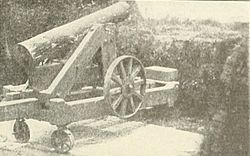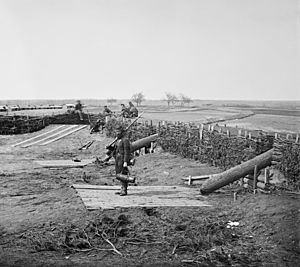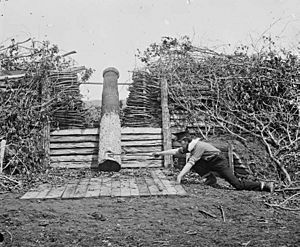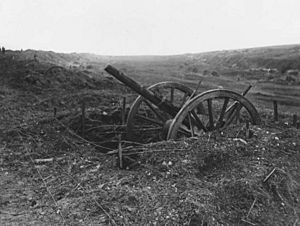Quaker gun facts for kids
A Quaker gun was a clever trick used in wars, mostly in the 1700s and 1800s. It looked like a real cannon, but it was actually just a wooden log. These logs were often painted black to make them seem more real. The main idea was to trick the enemy into thinking a fort or army had more powerful weapons than it really did. This helped to slow down the enemy.
The name "Quaker gun" comes from the Religious Society of Friends, also known as "Quakers." Quakers traditionally believe in peace and are against war. So, a "Quaker gun" was a "peaceful" gun because it couldn't actually fire!
Contents
How the First "Quaker Gun Trick" Worked
During the American Revolutionary War, a tough fight happened between American Colonel William Washington and British Lieutenant Colonel Banastre Tarleton. In October 1780, Colonel Washington had to retreat to North Carolina.
Washington needed more artillery (big guns) to fight the Loyalists, who supported the British. On December 4, his men managed to trap a Loyalist force of about 125 men. These Loyalists, led by Colonel Rowland Rugeley, were hiding in a house and barn near Camden, South Carolina.
Colonel Washington told his cavalry (soldiers on horseback) to get off their horses and surround the buildings. Hidden from Rugeley's view, Washington's men quickly made a pine log look like a cannon.
The "Quaker gun trick" worked perfectly! Colonel Washington pointed the fake wooden "cannon" at the buildings. He threatened to open fire if the Loyalists did not surrender right away. Colonel Rugeley quickly gave up his entire force. Not a single shot was fired!
Quaker Guns in Europe
Quaker guns were also used in Europe. During the Siege of Genoa in 1800, the French commander, André Masséna, used them. He placed wooden fake cannons on the city walls. This helped to confuse the Austrian army that was attacking the city. It made the Austrians think the French had more guns than they did.
Quaker Guns in the American Civil War
Both sides used Quaker guns during the American Civil War. The Confederate States Army often used them because they did not have many real cannons. They would paint the wooden guns black. Then, they would place them in their forts. This helped to delay attacks from the Union Army. Sometimes, they even used real cannon carriages to make the fake guns look more convincing.
One famous example was when Confederate General Joseph E. Johnston used them. In March 1862, he placed Quaker guns around Centreville, Virginia. This made it look like his forts were still full of soldiers. But his men were actually moving away to the Rappahannock River.

Another time, during the Siege of Corinth, the Confederate army secretly left the city. On the night of May 29, they used the Mobile and Ohio Railroad to move their sick, wounded, and supplies. As trains arrived, the troops cheered loudly. This made it sound like more soldiers were arriving. They also set up fake Quaker guns along their defenses. Campfires were kept burning, and musicians played. This helped the rest of the soldiers slip away without being noticed.
Quaker guns also helped the Confederates during the Siege of Petersburg. They helped them hold their positions for longer against the much larger Union army.
Quaker Guns in World War I
In World War I, airplanes started to be used for scouting. This meant armies could see what the enemy was doing from above. Because of this, both sides began to use tricks and camouflage. They would build fake guns or other equipment to fool enemy pilots.
Quaker Guns in World War II
Similar tricks were used in World War II. During the Doolittle Raid, American bombers attacked Tokyo. The B-25 bombers used in this raid did not have guns in their tails. This made them easy targets from behind. To fix this, Lieutenant Colonel Jimmy Doolittle had fake machine guns added to the tails. These "guns" were just two broomsticks painted black!
Before the invasion of France, German forces at Pointe du Hoc moved their real cannons. They replaced them with logs and barrels that looked like cannons. This was to trick Allied spy planes. The Allies also used lots of fake equipment in Operation Fortitude. This operation tricked the Germans into thinking a huge fake army was going to attack Calais.
Even a British battleship, HMS Centurion, was used as a Quaker gun. It was an old ship and had no real guns left by World War II. But from 1942 to 1944, it was given wooden guns. It was then placed in the eastern Mediterranean Sea. This made it seem like the British navy in that area was much stronger than it actually was.
The Soviet Union also used fake gun positions. They built them quickly from local wood. This helped to trick and confuse German planes flying overhead.
Wooden Cannons (The Real Ones)
It's important to know that a Quaker gun is different from a wooden cannon. A wooden cannon was a real weapon that could actually fire. However, they were very weak. They could usually only fire a few shots, or sometimes just one, before they broke apart. People used wooden cannons if they didn't have metal or the skills to make metal cannons.
|
See also
 In Spanish: Cañón cuáquero para niños
In Spanish: Cañón cuáquero para niños
 | Shirley Ann Jackson |
 | Garett Morgan |
 | J. Ernest Wilkins Jr. |
 | Elijah McCoy |




